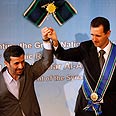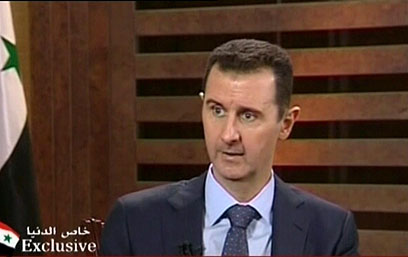
Report: Iran ships arms to Syria via Iraq
Western intelligence report indicates Iran uses civilian aircraft to fly arms, troops to aid Syria's Assad
Iran has been using civilian aircraft to fly military personnel and large quantities of weapons across Iraqi airspace to Syria to aid President Bashar Assad in his attempt to crush an 18-month uprising against his government, according to a Western intelligence report seen by Reuters.
Earlier this month, US officials said they were questioning Iraq about Iranian flights in Iraqi airspace suspected of ferrying arms to Assad, a staunch Iranian ally.
Related articles:
- UN confirms 'foreign elements,' jihadis, in Syria 'Assad planned chemical weapons transfer to Hezbollah' Al-Qaeda: We defeated US in Iraq
Iraq says it does not allow the passage of any weapons through its airspace. But an intelligence report obtained by Reuters says Iranian weapons have been flowing into Syria via Iraq in large quantities. Such transfers, the report says, are organized by the Islamic Revolutionary Guard Corps.
"This is part of a revised Iranian modus operandi that US officials have only recently addressed publicly, following previous statements to the contrary," said the report, a copy of which was provided by a UN diplomatic source.

'Assad receiving aid from Iran' (Photo: AP)
"It also flies in the face of declarations by Iraqi officials," it said. "Planes are flying from Iran to Syria via Iraq on an almost daily basis, carrying IRGC (Iranian Revolutionary Guard Corps) personnel and tens of tons of weapons to arm the Syrian security forces and militias fighting against the rebels."
Although the specific charges about Iraq allowing Iran to transfer arms to Damascus are not new, the intelligence report alleges that the extent of such shipments is far greater than has been publicly acknowledged, and much more systematic, thanks an agreement between senior Iraqi and Iranian officials.
Iran no longer ships via Turkey
The intelligence report, which Western diplomats said was credible and consistent with their information, said Iran had cut a deal with Iraq to use its airspace.
One envoy said it was possible that Tehran and Baghdad did not in fact have any formal agreement, only an informal understanding not to raise questions about possible arms transfers to Syria.
In comments published by Iranian media on Sunday, Mohammad Ali Jafari said members of the IRGC were providing non-military assistance in Syria and Lebanon. He added that Tehran might get involved militarily in Syria if its closest ally came under attack. A day later, however, Iran's foreign ministry denied those remarks.
Two Boeing 747 aircraft specifically mentioned in the intelligence report as being involved in Syria arms transfers – an Iran Air plane with the tail number EP-ICD and Mahan Air's EP-MNE – were among 117 aircraft hit with sanctions on Wednesday by the US Treasury Department.
The Treasury Department also blacklisted aircraft operated by Iran's Yas Air for supplying Syria with weapons. A UN panel of experts that monitors compliance with UN sanctions against Iran has repeatedly named Yas Air, along with Iran Air, as supplier of arms to Syria.
The Treasury Department statement on the new blacklistings said the move would "make it easier for interested parties to keep track of this blocked property, and more difficult for Iran to use deceptive practices to try to evade sanctions."
The statement did not mention Iraq.
Earlier this year, the UN panel of experts recommended that Yas Air be put on the UN blacklist for helping Iran skirt a UN arms embargo. So far the Security Council has not taken any action on that recommendation.
The UN panel's reports have described Iranian arms shipments to Syria via Turkey, not Iraq.
The intelligence report said such transfers across Turkish airspace had ceased.
"Since Ankara adopted a firm position against Syria, and declared that it would intercept all weapons shipments sent to the Assad regime through Turkish territory or airspace, Tehran has all but completely stopped using this channel," it said.
Tehran is forbidden from selling weapons under a UN arms embargo, which is part of broader sanctions against Iran over its nuclear program.
- Receive Ynetnews updates directly to your desktop










